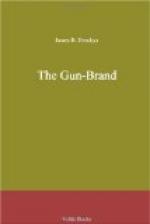The Company stood loyally between its trader and the prison bars; but the old order had changed in the Northland. Young Lapierre’s action was condemned and he was dismissed from the Company’s service with a payment of three years’ unearned salary whereupon, he promptly turned free-trader, and his knowledge of the methods of the H.B.C., the Indians, and the country, made largely for success.
The life of the free-trader satisfied his longing for travel and adventure, which his life as a post-trader had not. But it did not satisfy his innate craving for excitement. Therefore, he cast about to enlarge his field of activity. He became a whiskey-runner. His profits increased enormously, and he gradually included smuggling in his repertoire, and even timber thieving, and cattle-rustling upon the ranges along the international boundary.
At the time of his meeting with Chloe Elliston he was at the head of an organized band of criminals whose range of endeavour extended over hundreds of thousands of square miles, and the diversity of whose crimes was limited only by the index of the penal code.
Pierre Lapierre was a Napoleon of organization—a born leader of men. He chose his liegemen shrewdly—outlaws, renegades, Indians, breeds, trappers, canoemen, scowmen, packers, claim-jumpers, gamblers, smugglers, cattle-rustlers, timber thieves—and these he dominated and ruled absolutely.
Without exception, these men feared him—his authority over them was unquestioned. Because they had confidence in his judgment and cunning, and because under his direction they made more money, and made it easier, and at infinitely less risk, than they ever made by playing a lone hand, they accepted his domination cheerfully. And such was his disposition of the men who were the component parts of his system of criminal efficiency, that few, if any, were there among them who could, even if he so desired, have furnished evidence that would have seriously incriminated the leader.
The men who ran whiskey across the line, cached it. Other men, unknown to them, disguised it as innocent freight and delivered it to the scowmen. The scowmen turned it over to others who, for all they knew, were bona fide settlers or free-traders; and from their cache, the canoemen carried it far into the wilderness and either stored it in some inaccessible rendezvous or cached it where still others would come and distribute it among the Indians.
Each division undoubtedly suspected the others, but none but the leader knew. And, as it was with the whiskey-running, so was it with each of his various undertakings. Religiously, Pierre Lapierre followed the scriptural injunction; “Let not thy left hand know what thy right hand doeth.” He confided in no man. And few, indeed, were the defections among his retainers. A few had rebelled, as Vermilion had rebelled—and with like result. The man dismissed from Lapierre’s service entered no other.




